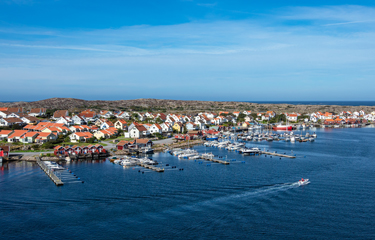One of Europe’s most ambitious land-based salmon-farming projects has landed another major partner, as Quality Salmon signed a collaboration agreement with processing equipment manufacturer BAADER.
The agreement brings BAADER into a massive, multi-billion krona project that will farm and process around 100,000 metric tons of salmon annually in Sotenäs, Sweden. The planned fish farm complex, organized by the Municipality of Sotenäs and Lighthouse Finance A/S, will be the largest in Europe when complete, and provide around 2,000 jobs. It has an estimated price tag of SEK 17 billion to SEK 20 billion (USD 1.6 billion to USD 1.9 billion, EUR 1.5 billion to EUR 1.8 billion).
“Investing SEK 17 billion to SEK 20 billion in the circular industry park and aiming for a future production of 100,000 tons of salmon per year demonstrates our level of ambition pretty clearly,” Lighthouse Finance CEO Roy W. Høiås said. “We want to do more than just promote the production of salmon. That is why we have chosen to partner with BAADER as we share a mutual vision that sustainability and innovation are key drivers for success and development of Quality Salmon.”
Lübeck, Germany-based BAADER has agreed to provide “holistic, automated, digitalized, and sustainable processing solutions that best support the project’s overarching goal,” according to BAADER Fish Managing Director Robert Focke.
“As the world’s requirement for nutrition is rapidly growing, processing resources in an optimal way is key to providing high-quality food for present and future generations. This is where fully integrated salmon wall-to-wall solutions, from stunning to packing, play a major role,” Focke said.
When completed, the Quality Salmon project – being built on a 140-hectare site in an industrial park in Sotenäs – will include a recirculating aquaculture system (RAS) salmon farm, feed factory, slaughter and processing facilities, residual and byproducts capture and reuse facilities, and water purification. The project will also include a 40-megawatt solar array so the entire project creates minimal carbon emissions, and will contribute no discharge into the ocean, according to Høiås.
In an interview with SeafoodSource, Høiås said, after hearing the ambition of the goals of the municipality of Sotenäs, he proposed a project designed on a circular economy model of salmon-farming.
“The circular industry model was the only way to be able to reach all the goals that the municipality has for economic growth, job creation, sustainability and [environmental, social, and corporate governance],” he said. “As a result, it was not enough to have best [fish]-farming players with us, we also need to have the best suppliers with us in the park. They will not only support us with the best solutions today, but [we are] actually demanding that they will be a part of the industry park for next 25 years to be a part of creating this new industry solution.”
Focke said participation in the Sotenäs project was a way for BAADER to contribute to the advancement of the salmon-farming sector globally.
“We are convinced that RAS farming in combination with state-of-the-art BAADER processing technology and the comprehensive collection and analysis of information in the value chain will not only help to meet the future demand for safe and sustainable proteins, but will also make an important contribution to the development of regions with limited infrastructure and employment opportunities,” Focke said.
BioMar and Aquamaof have also joined on as partners in the project.
Photo courtesy of Ricok/Shutterstock







